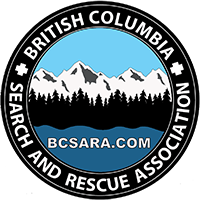The BC Search & Rescue (SAR) Program
Professional and Volunteer Driven
Ground Search and Rescue (GSAR) in British Columbia is done solely by volunteers. On call 24 hours a day, 365 days a year, these unpaid professionals provide their time, their own gear and their dedication and expertise at no cost to the people of BC and to the subjects they rescue.
Three Categories of SAR in BC
Air Rescue
Canada’s airspace is the responsibility of the Canadian Forces and the Royal Canadian Air Force (RCAF). In BC, that’s 442 Transport and Rescue Squadron based in Comox, BC. Searches and rescues of downed aircraft are performed by the RCAF with the assistance of the volunteer Civil Air Search and Rescue Association (CASARA).
Ground & Inland Water Rescue
Missing persons are the responsibility of the police force of jurisdiction, which for most of BC means Royal Canadian Mounted Police “E” Division, who enlist the volunteer member groups of the BC Search and Rescue Association (BCSARA) through Emergency Management BC (EMBC).
In BC, GSAR is coordinated through EMBC which sets guidelines for GSAR groups and provides funding for operations, as well as its other responsibilities overseeing public safety responses in BC.
There are 78 ground search and rescue groups in the province. To learn how to volunteer for one or see a map of where they are click here.
Marine Rescue
Marine Search and Rescue covers Canada’s three oceans and one of the most dangerous and complex coastlines in the world. The Canadian Coast Guard and the volunteer Royal Canadian Marine Search and Rescue (RCMSAR), formerly the Coast Guard Auxiliary, provide response.
Ground Search & Rescue (GSAR)
Regional Responsibility
Each group is responsible for a certain region of the province; they assess the kind of terrain they need to respond to, and the weather and mountain conditions they need to operate in.
Needs Assessment
Over time, groups develop a needs assessment based on the kinds of searches or rescues they are asked to perform, and they use this information to decide what kind of training, equipment and rescue capabilities they need to develop. As technology and subject profiles change, the various groups reassess their needs regularly.
Response Capability
Dividing the province into regions allows each group to tailor its response capability to the needs of the communities they serve, and lets local knowledge and experience guide how the groups respond to tasks.
SAR Operations Policy
All SAR teams in BC operate under the policies, procedures and guidelines set out by Emergency Management BC. These include safety plans, standards for training and rescue equipment, and rules under which a SAR group may be activated, and “stood down.”
Requesting Agencies
The following agencies can request a SAR group to respond:
BC Ambulance Service
BC Emergency Healt Services (BCEHS) is often the first call for an injured person. If that person is a significant distance from a road, BCEHS frequently calls for GSAR to assistance to access, stabilize package and transport the subject, all skills that GSAR groups train for. Search and Rescue has a very close relationship with BCEHS and many paramedics are GSAR volunteers in their spare time.
BC Coroners Service
The tragic result of some GSAR tasks is the death of a subject. Any death in BC falls under the jurisdiction of the BC Coroner’s Service (BCCS). However, because of weather, terrain or remote locations, BCCS will regularly ask GSAR for assistance to transport the deceased.
Canadian Forces & Coast Guard
The military can ask GSAR to assist in its duties to search for and access downed aircraft or watercraft in distress in inland waters.
Parks Canada
There are seven national parks in British Columbia which take up a huge area of land. While Parks Canada maintains a group of professional and extremely well-trained rescue personnel in these parks, they can request additional GSAR resources when needed. A reciprocal agreement is in place where Parks Canada can assist outside of their parks in certain circumstances.
Fire Departments
Fire/rescue services are responsible for all rescue within municipal boundaries and are the first responders to many medical rescues. Fire departments regularly work closely with GSAR to maintain interoperability for when specialized rescue techniques are required or when a rescue requires additional resources.
Police of Jurisdiction
RCMP or municipal police are responsible for all missing persons within British Columbia and are the first responders to calls of individuals reported overdue or missing. Police departments request GSAR to utilize specialized training to assist in searching for and rescuing individuals who are missing.
Become A Search & Rescue Volunteer
SAR Groups In BC
Incidents Per Year
Volunteers
Contact

P.O. Box 2176
Sidney BC
V8L 3S6
Canada

For Emergencies, Call 911 or
1-800-461-9911 (Toll Free)
250-374-5937 (Cellphone/SAT Phone/Outside BC)




